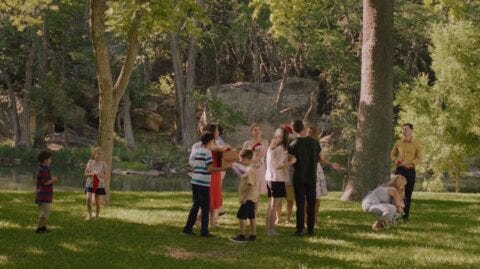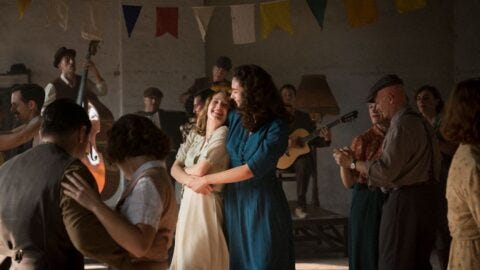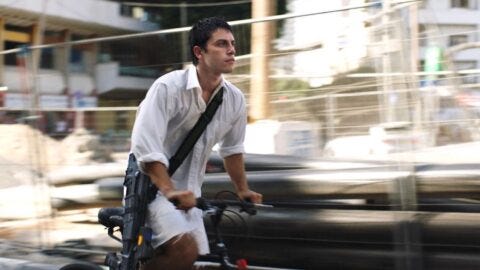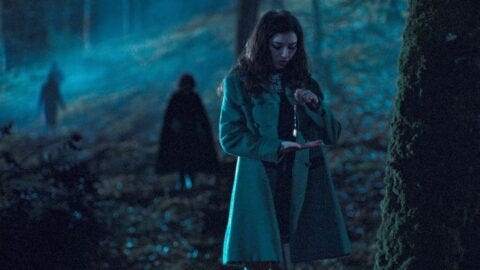As Locarno races around the first bend, still drawing attention before the real cinephiles decamp mid-fest for the Balkan climbs of Sarajevo or Dokufest — before all summer festivals are subsumed into the stratospheric hype of Venice and (in a latter sense for us Europeans) Toronto, it’s worth to take stock of what we’ve (I’ve) seen so far.
The people actually there are raving about the new Radu Jude, the typically long-titled Do Not Expect Too Much From the End of the World (2023), which I’ve managed to commission a review for (check this space), as well as The Permanent Picture (Laura Ferrés, 2023), which I found deathly dull/weirdly smug, and didn’t finish. But that’s the thing with film festivals: there’s a little something for everyone.
Of course, the real standout, and the film that has Baccara’s “Yes Sir, I Can Boogie” stuck in my head, possibly forever, is Animal (Sofia Exarchou, 2023). Five-star review from me, with an interview to come…
Anyway, the first five reviews out, from Greece, Israel, Italy, France and Texas, show a healthy festival slate so far, with three bangers, one underwhelming experience, and one outright mid movie. Check it out below:
Animal Oozes with Summertime Sadness
They are called the animateurs. Their role is to provide amusement to lazy tourists — from Russia, Austria, Britain — who wouldn’t think for a second to actually venture out of the hotel and experience the real Greece. They sing, they dance, they play make-believe. They’re unbearably kitsch, moderately talented and incredibly committed. But they’re only here for the summer. After a while, most of them will move on to different things.
But not everyone. Some people seem committed to doing the same thing, over and over again, for the rest of their lives. Some don’t seem to fit anywhere else. Some people just can’t change who they are. Perhaps they’re just like an Animal (Sofia Exarchou, 2023).
This excellent competition entry film brims with sociological detail, touristic critique and intense character study, truly counting the cost of the holiday entertainment complex on the all-smiling, all-singing, all-laughing crew. Anchored by a gripping, fully-alive, three-dimensional performance by Dimitra Vlagopoulou as head animateur Kalia — the type of work that seems to dictate the tone of the film as opposed to the other way around — Exarchou’s sophomore feature is a standout work that cuts straight for the heart, one insanely cheesy song at a time.
Read the rest over at Journey Into Cinema.
Family Portrait Zooms In, Zooms Out, Hiding the Full Picture
Family is an ever-mutating, gestating thing, never quite the same from one year to the next. The eternal march of births, deaths, boyfriends, girlfriends, marriages, sickness, transformation and migration, ensures that there is no fixed point where one family can be said to be one way. But with a Christmas card, perhaps, some moments can be frozen in time forever, staring back at you, whispering: this is the way we were, if only for a little while.
Zooming in, zooming out, floating all about, ducking and weaving, slipping and sliding, the ever-elusive Concorso Cineasti del Presente entry Family Portrait (Lucy Kerr, 2023) creates an enigmatic family mosaic, collected from the different shards of subjective experience. With an air of the Modernist novels of Virginia Woolf or the short stories of Katherine Mansfield, Kerr creates a complicated, unsettling reverie about the impermanence of the family unit. It’s a fine calling card from debut director Lucy Kerr; slow, contemplative, beguiling and eerily compelling.
Read the rest over at Journey Into Cinema.
Beautiful Summer Starts a Conversation That It Never Finishes
Women posing nude for men embody something of a paradox. On the one hand, they’re free and proudly showing off their bodies and sexuality. On the other, they’re giving men the chance to objectify them, to reduce them to their parts. Still, the female nude persists as a key part of art history. A famous Guerrilla Girls poster from 1989 asks: “Do women have to be naked to get into the Met. Museum?” stating that while less than five percent of artists at the New York Metropolitan Museum are women, 85% of nudes are of female bodies. Historically speaking, women seem to be more the subject of art than its creators.
The same goes for film. Emmanuelle Béart is naked for much of the runtime of Jacques Rivette’s captivating masterpiece La Belle Noiseuse (1991), studiously drawn by Michel Piccoli. And Leonardo DiCaprio captures the curves of Kate Winslet in The Titanic (James Cameron, 1997) after her character implores him to paint her like one of his French girls. The reverse, a man painted by a woman, his privates freely hanging, has rarely (if at all?) been committed to film. While men are uglier, that’s probably only half of the problem!
Read the rest over at Journey Into Cinema.
The Vanishing Soldier. Israel Smoulders.
Shlomi (Ido Tako) is an easy person to empathise with. Whom amongst us wouldn’t take the chance to run away from fighting in the IDF with both hands? In an early gripping scene — filled with tense long takes, and careful tracking camera movements — he sneaks out of a house, steals a car and hightails it out of the Gaza Strip. I’d do the same.
But he is not escaping for moral reasons, or even cowardice. He is escaping for love, to convince his girlfriend, Shiri (Mika Reiss), to stay with him in Isreal as opposed to moving to Canada. Risking prison, death and international controversy, we follow The Vanishing Soldier (Dani Rosenberg, 2023) over frantic 24 hours in Tel Aviv, creating both a character portrait of a rather silly man and of a unique nation constantly in a state of war.
Read the rest over at Journey Into Cinema.
Once Bitten, Twice Enchanted
Françoise (Léonie Dahan-Lamort) is convinced she’s going to die.
Not in some unspecified moment in the future, like everyone else, but tonight. In a ball of fire. Like Joan of Arc. She knows because she saw it in a dream.
Françoise might come across as a little melodramatic. But she is a boarder at a French boarding school, where one is constantly reminded of fire, brimstone and eternal damnation. She’s also seventeen and a virgin; simultaneously enchanted and repelled by the prospect of sex, a little death in and of itself. Endeavouring to enjoy the last night of her life, she ropes in her best friend Delphine (Lilith Grasmug) to break loose from school and attend a costume party in the countryside.
Evoking the horror aesthetic of Werner Herzog’s Nosferatu the Vampyre (1979), the retro-pleasures of Peter Strickland films, and even the Twilight trilogy, Concorso Cineasti del presente entry Bitten (Romain de Saint-Blanquat, 2023) is a beguiling ode to the doomed romanticism of youth.
Read the rest over at Journey Into Cinema.








